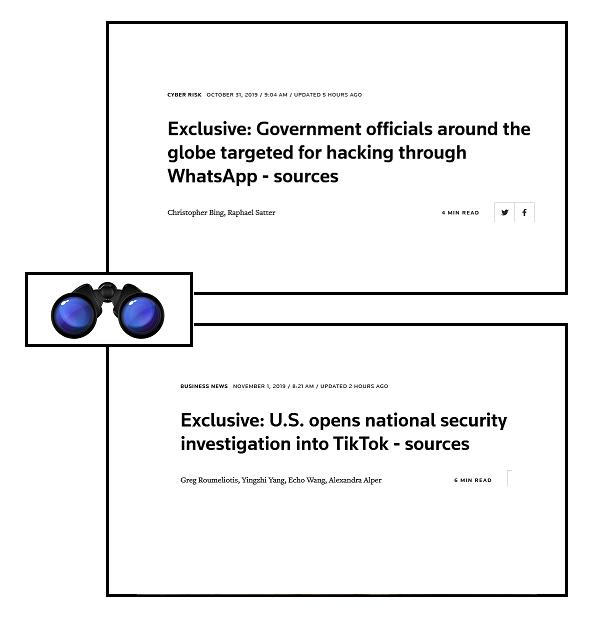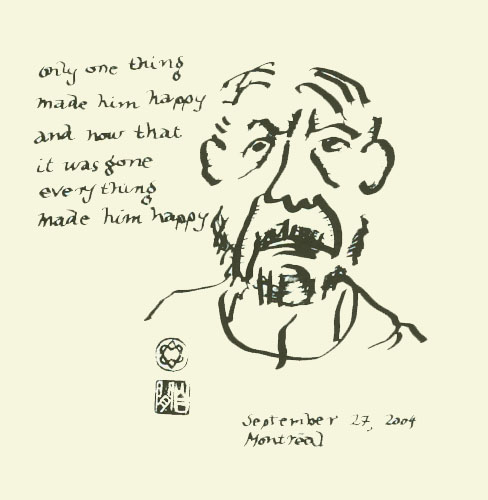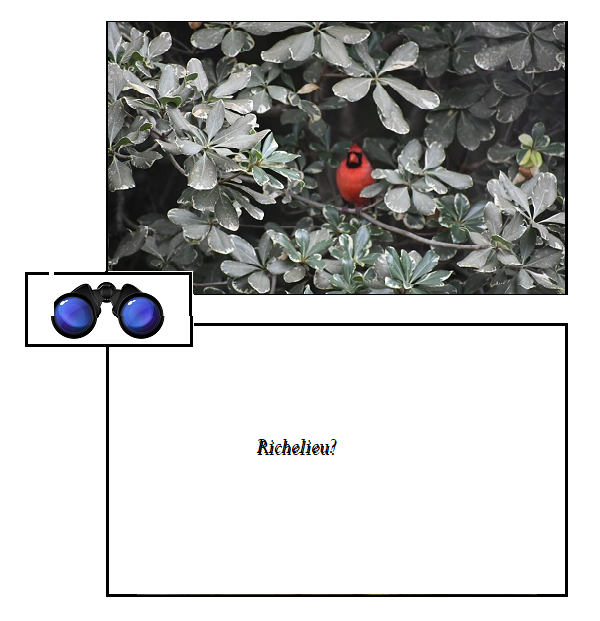The anti-social in Social Media?
Friday, November 1st, 2019[ by Charles Cameron — online community member for 20 or more years, usenet user before that, made good friends and happy overall ]
.
There’s FaceBook vs Twitter — and then, well, Reuters has the stories:
**
On the one hand:
Sources familiar with WhatsApp’s internal investigation into the breach said a “significant” portion of the known victims are high-profile government and military officials spread across at least 20 countries on five continents. Many of the nations are U.S. allies, they said.
The hacking of a wider group of top government officials’ smartphones than previously reported suggests the WhatsApp cyber intrusion could have broad political and diplomatic consequences.
WhatsApp filed a lawsuit on Tuesday against Israeli hacking tool developer NSO Group. The Facebook-owned software giant alleges that NSO Group built and sold a hacking platform that exploited a flaw in WhatsApp-owned servers to help clients hack into the cellphones of at least 1,400 users between April 29, 2019, and May 10, 2019.
The total number of WhatsApp users hacked could be even higher. A London-based human rights lawyer, who was among the targets, sent Reuters photographs showing attempts to break into his phone dating back to April 1.
While it is not clear who used the software to hack officials’ phones, NSO has said it sells its spyware exclusively to government customers.
Some victims are in the United States, United Arab Emirates, Bahrain, Mexico, Pakistan and India, said people familiar with the investigation. Reuters could not verify whether the government officials were from those countries or elsewhere.
Some Indian nationals have gone public with allegations they were among the targets over the past couple of days; they include journalists, academics, lawyers and defenders of India’s Dalit community.
On the other:
The U.S. government has launched a national security review of TikTok owner Beijing ByteDance Technology Co’s $1 billion acquisition of U.S. social media app Musical.ly, according to two people familiar with the matter.
While the $1 billion acquisition was completed two years ago, U.S. lawmakers have been calling in recent weeks for a national security probe into TikTok, concerned the Chinese company may be censoring politically sensitive content, and raising questions about how it stores personal data.
TikTok has been growing more popular among U.S. teenagers at a time of growing tensions between the United States and China over trade and technology transfers. About 60% of TikTok’s 26.5 million monthly active users in the United States are between the ages of 16 and 24, the company said earlier this year. [ … ]
“With over 110 million downloads in the U.S. alone, TikTok is a potential counterintelligence threat we cannot ignore,” Schumer and Cotton wrote to Joseph Macguire, acting director of national intelligence.
TikTok allows users to create and share short videos with special effects. The company has said U.S. user data is stored in the United States, but the senators noted that ByteDance is governed by Chinese laws.
**
Sources:
Reuters Oct 31 2019, Exclusive: Government officials around the globe targeted Reuters Nov 1 2019, Exclusive: U.S. opens national security investigation into TikTok
Not bad for a two-day haul.
**
BTW, Twitter vs FaceBook:
Guardian 31 Oct 2019, Twitter’s canny political ad ban costs it little – and piles pressure on Facebook .
The Twitter co-founder and chief executive, Jack Dorsey, has turned a weakness into a strength, cutting off a minuscule revenue stream in order to heap pressure on his main competitor. In the hours since Twitter’s announcement, support has come from voices as diverse as the US-based campaign group Muslim Advocates, the Open Knowledge Foundation thinktank and the screenwriter Aaron Sorkin. [ … ]Sorkin, writing in the New York Times, criticised Mark Zuckerberg for enabling the “crazy lies pumped into the water supply that corrupt the most important decisions we make together”. The screenwriter behind The Social Network, a film about Facebook’s early years, joined in a chorus of criticism of the site’s policy of explicitly allowing misinformation in political adverts.
“Right now, on your website, is an ad claiming that Joe Biden gave the Ukrainian attorney general a billion dollars not to investigate his son. Every square inch of that is a lie and it’s under your logo. That’s not defending free speech, Mark, that’s assaulting truth,” he wrote.
Go Twitter!
**
Facebook, Twitter, WhatsApp, TikTok — just lining up some ducks..







